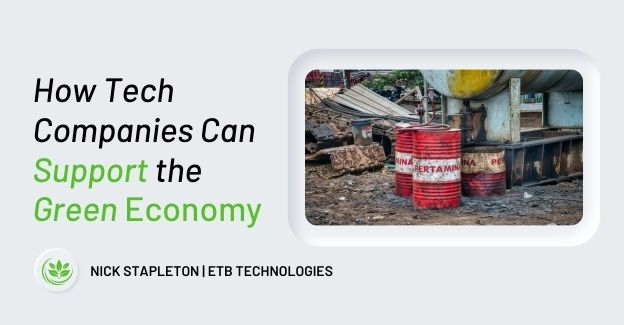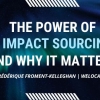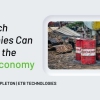Environmental concerns are rapidly becoming business concerns and many clients are looking for sustainable solutions says Nick Stapleton, Managing Director at ETB Technologies. With the U.K. government (and other governments worldwide) focused on tackling climate change and becoming carbon neutral, businesses need to balance finding suppliers that have green credentials with maintaining profit margins. This article looks at how businesses can support the green economy while still making good business decisions, and how governments can incentivize businesses in this endeavor.
In October 2021, the U.K. government published its “Build Back Greener” strategy with the goal of tackling climate change by decarbonizing all sectors of the economy and meeting its net zero target by 2050.
As part of its strategy, the government sought to encourage individuals and organizations to recycle, reuse, or refurbish to reduce the amount of waste generated and sent to landfills – a key tenet in creating a circular economy. Currently landfills have a significant amount of e-waste – computers, tablets and other electronic equipment – that could have been either recycled or made good as new with a little work.
How IT and Technology E-Waste Impacts the Environment
In addition to e-waste in landfills, IT equipment produces a significant amount of waste and emissions during production. Much of the IT equipment we use is built with rare materials – the extraction of which is fueling climate change and creating pollution. As a result, the IT sector has historically been a negative contributor to the environment. But we can change this.
On the surface it might seem that the simplest solution to improving IT’s impact on the environment is to encourage people to recycle or reuse their equipment to reduce waste. From an IT perspective, however, recycling is an energy intensive process, and reusing equipment can mean sacrificing quality, speed, and reliability.
We must, therefore, look to prioritize the refurbished market to support the green economy. This could have a massive influence on our industry’s impact on the environment. In fact, one report found the circular economy could deliver 80% of the emissions reductions the U.K. needs to meet its goals for 2028-2032. Aiding this should be our goal.
Business Reasons to Support Circular
While the environmental benefits could be huge, there are other reasons for businesses to choose refurbished hardware. For example, due to world-wide supply chain issues, some enterprise manufacturers are quoting lead times of over 100 days to fulfill orders, leading to huge delays for businesses that depend on technology for their day-to-day operations. Refurbished equipment vendors, on the other hand, have items readily available, in some cases being delivered within 24 hours of placing the order.
Businesses can also get more for their money by choosing refurbished equipment: a business planning to buy a new server may be able to get a refurbished one with the same specs for half the price – or one with more capacity for the same price.
Refurbished and the End User
There is little downside for the end user in using refurbished equipment; over the past two decades, the industry has matured and there are far higher professional standards than when it was in its relative infancy at the turn of the millennium, including warranties as good as buying new. In many cases, refurbished products are comparable to new ones in terms of their performance, too.
The challenge lies in changing perceptions among businesses, to encourage them to think of refurbished first when choosing new or upgrading IT equipment.
The move to remote working coupled with a global shortage of semi-conductors and supply chain challenges has undoubtedly made the circular economy more attractive to businesses looking to invest and stay ahead during the difficulties of the past few years. But offices throughout the UK are reopening. Delays across the supply chain are ending. And as an industry, we can’t rely on these alone to drive forward the green economy.
The Government’s Role
Government incentives and other subsidies will be key to ensuring businesses continue considering refurbished hardware. In the December budget the Scottish Government allocated £43m toward supporting this sector; the wider U.K. government needs to also consider how to incentivize companies to reduce or remove emissions from their supply chain.
A good place to start would be for the U.K. government to update the super-deduction allowance, which lets British businesses claim back up to 25p for every £1 they invest in “qualifying” machinery and equipment, before it ends in April 2023.
Refurbished machinery isn’t currently included in this allowance but – given the crucial role it has played in helping businesses access lower-cost, quality machinery while supporting carbon-friendly business decisions – it should be. VAT was taken off renewable energy purchases in the March 2022 budget announcement; surely a similar measure could be introduced to encourage refurbished purchases?
Looking Ahead
In the face of widespread price increases across the economy, businesses everywhere are looking at how to reduce their spend, while governments look to reduce waste and carbon emissions. The circular economy is the ideal marriage of these two goals.
The U.K. government has already recognized in its strategy that the circular economy can play a key role in driving down emissions and positively contributing to the global climate setting agenda. But if the government wants to show it is serious about meeting its net zero target by 2050, refurbished equipment needs to be prioritized and support given to businesses to enable more carbon-friendly investment decisions.









